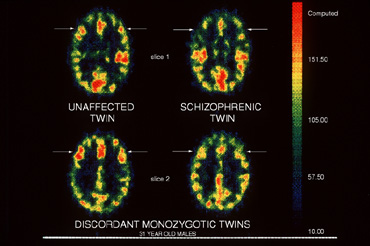Schizophrenia ‘made up of eight specific genetic disorders’
Past studies have indicated that rather than being a single disease, schizophrenia is a collection of different disorders. Now, a new study by researchers at Washington University in St. Louis, MO, claims the condition consists of eight distinct genetic disorders, all of which present their own specific symptoms.
The research team, including senior investigator Dr. C. Robert Cloninger, the Wallace Renard Professor of Psychiatry and Genetics at Washington University, says their findings may pave the way for better diagnosis and treatment strategies for schizophrenia.
Schizophrenia is a mental disorder characterized by hallucinations, delusions, abnormal thoughts, cognitive problems and agitated body movements.
People with a family history of schizophrenia are at much higher risk of developing the condition. Approximately 1% of the general population in the US have schizophrenia, but it occurs in around 10% of individuals who have a first-degree relative with the disorder.
Researchers have worked long and hard to identify specific genes associated with schizophrenia. Earlier this year, Medical News Today reported on a study led by researchers from the Cardiff University School of Medicine in the UK, in which they identified 83 new genes linked to schizophrenia.
But Dr. Cloninger says that rather than trying to pinpoint specific genes to schizophrenia development, he and his colleagues wanted to look at how individual genes work together.
Fast facts about schizophrenia in the US
- Schizophrenia is one the leading causes of disability in the US
- Approximately 75% of people who develop schizophrenia are between the ages of 16 and 25
- Past research has indicated that 25% of people with schizophrenia recover completely, 25% have symptoms that do not improve over time, while 50% have symptoms than improve over a 10-year period.
“Genes don’t operate by themselves,” he says. “They function in concert much like an orchestra, and to understand how they’re working, you have to know not just who the members of the orchestra are but how they interact.”
Analyzing genetic variations and identifying clusters
 For their study, results of which are published in The American Journal of Psychiatry, the team analyzed the genomes of 4,200 people with schizophrenia and 3,800 people without the disorder.
For their study, results of which are published in The American Journal of Psychiatry, the team analyzed the genomes of 4,200 people with schizophrenia and 3,800 people without the disorder.
Specifically, they looked at almost 700,000 areas of the genome where a variation occurred in a single unit of DNA. This variation is known as a single nucleotide polymorphism (SNP).
By comparing the SNPs of schizophrenic individuals with those of healthy controls, the team was able to identify the genetic variations linked to schizophrenia. Individuals with schizophrenia were divided into groups based on the type and severity of their symptoms. The team looked at how the genetic variations interacted with each other to produce specific symptoms of the disorder.
Dr. Cloninger and colleagues say they identified specific gene clusters associated with eight different types of schizophrenia, all of which present recognizable symptoms. For example, the team discovered a gene cluster that posed a 95% risk of schizophrenia, which they specifically linked to hallucinations or delusions.
The researchers also analyzed two other databases of individuals with schizophrenia and were able to replicate their findings.
“What we’ve done here, after a decade of frustration in the field of psychiatric genetics, is identify the way genes interact with each other, how the ‘orchestra’ is either harmonious and leads to health, or disorganized in ways that lead to distinct classes of schizophrenia,” says Dr. Cloninger.
Genes ‘work in concert’ to disrupt brain structure and function, causing schizophrenia
The team explains that individual genes linked to schizophrenia only have weak and inconsistent associations with the disorder. But when these genes interact and work as clusters, they pose a 70-100% risk of developing schizophrenia, meaning those with such clusters are unlikely to avoid the disorder.
Commenting on their findings, co-investigator Dr. Dragan Svrakic, a professor of psychiatry at the university, says:
The researchers believe their findings could lead to better diagnosis and treatments for people with schizophrenia. By identifying genetic variations in people with schizophrenia and linking them to specific symptoms, they say it may be possible to target treatments to specific pathways that contribute to the disorder.
The team says the approach used in this study may also improve understanding of how genes collaborate to cause other common disorders.
“People have been looking at genes to get a better handle on heart disease, hypertension and diabetes, and it’s been a real disappointment,” says Dr. Cloninger. “Most of the variability in the severity of disease has not been explained, but we were able to find that different sets of genetic variations were leading to distinct clinical syndromes. So I think this really could change the way people approach understanding the causes of complex diseases.”
Medical News Today recently reported on a study published in JAMA Psychiatry claiming obsessive-compulsive disorder (OCD) may be a risk factor for schizophrenia.
###
Written by Honor Whiteman